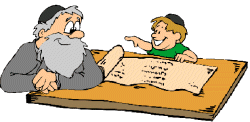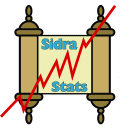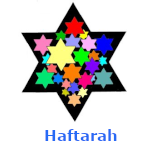Mattoth
מַּטּוֹת
Numbers 30:2 – 32:42
Vows made to HaShem
Moses spoke to the tribal heads of the Israelites, telling them that this is the word that HaShem had commanded: If a man makes a vow to HaShem, or makes an oath to obligate himself, he must not break his word. He must do all that he expressed verbally. This is the law when a woman makes a vow to HaShem or binds herself by an obligation while still a girl in her father’s house.If her father remains silent when he hears her vow or self-imposed obligation, then all her vows and self-imposed obligations must be kept.
However, if he obstructs her on the day he hears it, then any such vow or self-imposed obligation of hers shall not be fulfilled. Since her father has obstructed her, HaShem will forgive her. This is the law if she is married to a man and is bound by her vows and self-imposed verbal obligations. If the men in her life hear about it and remain silent on the day they hear, then her vows and self-imposed obligations must be kept.
However, if the men in her life obstruct her on the day they hear about it, they can cancel her vows and self-imposed verbal obligations, and HaShem will forgive her. The vow of a widow or divorcee must be kept, no matter what obligation she takes upon herself. This is the law if a woman makes a vow or an oath for a self-imposed obligation in her husband’s house. If her husband hears it and remains silent without obstructing her, then all her vows and self-imposed obligations must be kept. However, if her husband annuls them on the day he hears them, then all her verbally expressed vows and self-imposed obligations need not be kept. Since her husband has annulled them, HaShem will forgive her. Thus, in the case of every vow or oath involving self-denial, a woman’s husband can uphold them, and her husband can annul them.
If her husband remains silent for the entire day, then he has automatically upheld any vow or obligation that she has assumed. He has upheld them simply by remaining silent on the day he heard them.However, if he annuls them after hearing them, he removes any guilt that she may have for violating them.These are the rules that HaShem commanded Moses regarding the relationship between a man and his wife, and between a father and his daughter as long as she is a girl in her father’s house.
Attacking the Midianites
HaShem spoke to Moses, saying: “Take revenge for the Israelites against the Midianites. Then you shall die and be gathered to your people.”Moses spoke to the people, saying: “Detach men for armed service against Midian, so that HaShem’s revenge can be taken against the Midianites. One thousand from each of Israel’s tribes shall be sent into armed service.” From the thousands of Israel, 1000 volunteered from each tribe, [a total of] 12,000 special troops. Moses sent forth the 1000 men from each tribe as an army along with Pinchas son of Eleazar the priest, who was in charge of the sacred articles and signal trumpets.
They mounted a surprise attack against Midian as HaShem had commanded Moses, and killed all the adult males.Along with the other victims, they also killed the five kings of Midian: Evi, Rekem, Tzur, Chur, and Reva, the five Midianite kings. They also killed Balaam son of Beor by the sword. The Israelites took captive all the women of Midian and their children. They took as booty all their animals, all their possessions, and all their wealth. The Israelites also set fire to all their residential cities and fortresses, taking all the booty and plunder, both man and beast. They brought the captives, the plunder, and the spoils to Moses, Eleazar the priest, and the entire Israelite community, who were in the Western Plains of Moab, on the Jericho Jordan. Moses, Eleazar and all the community princes went out to greet them outside the camp. However, Moses was angry at the generals and captains, who were the officers returning from the military campaign.
“Why have you kept all the women alive?” demanded Moses.
“These are exactly the ones who were involved with the Israelites at Balaam’s instigation, causing them to be unfaithful to HaShem in the Peor incident, and bringing a plague on HaShem’s community. Now kill every male child, as well as every woman who has been involved intimately with a man. However, all the young girls who have not been involved intimately with a man, you may keep alive for yourselves. You must now remain outside the camp for seven days. Whoever killed a person or touched a corpse must purify himself on the third and seventh days. As far as you and your captives are concerned, every garment, every leather article, anything made of goat products, and every wooden article, must undergo such purification.”
Purification After the War
Eleazar the priest said to the soldiers returning from the campaign: This is the rule that HaShem commanded Moses: As far as the gold, silver, copper, iron, tin and lead are concerned, whatever was used over fire must be brought over fire and purged, and [then] purified with the sprinkling water. However, that which was not used over fire need only be immersed in a mikvah. You yourselves must also immerse your bodies and your garments on the seventh day, and you will then be clean so that you can enter the camp.
Dedicating a Portion of the Spoils
HaShem spoke to Moses, saying: “Together with Eleazar the priest and the community’s paternal leaders, you must take an accounting of the men and animals plundered as spoil. Then divide the plunder equally, giving half to the warriors who went out to battle and the other half to the community. From the soldiers who participated in the campaign, levy a tax to HaShem consisting of one out of 500 of the humans, cattle, donkeys and sheep. Take this from their half, and give it to Eleazar the priest as an elevated gift to me. From the half that is going to the other Israelites, take one part out of 50 of the humans, cattle, donkeys, sheep and other animals, and give it to the Levites who are entrusted with HaShem’s Tabernacle.” Moses and Eleazar the priest did as HaShem had commanded Moses.
In addition to the goods that the troops had taken as booty, the plunder consisted of 675,000 sheep, 72,000 head of cattle,61,000 donkeys, and 32,000 young women.The half-portion for those who went out in the army was as follows: The number of sheep was 337,500, and the tax for HaShem from the sheep consisted of 675 sheep. There were 36,000 cattle, out of which the tax for HaShem was 72. There were 30,500 donkeys, out of which the tax for HaShem was 61. There were 16,000 humans, out of which the tax for HaShem consisted of 32 individuals. Moses gave the tax to Eleazar the priest as an elevated gift to HaShem, as HaShem had commanded Moses.The half that Moses took from the military men for the other Israelites as the community’s portion consisted of 337,500 sheep, 36,000 cattle, 30,500 donkeys, and 16,000 girls.
From the humans and beasts that were the Israelites’ half, Moses took one out of fifty and gave them to the Levites, who are entrusted with HaShem’s Tabernacle. It was all done as HaShem had commanded Moses.
The generals and captains, who were officers over the army’s divisions, approached Moses.They said to Moses, “We have taken a census of the warriors under our command and not a single man has been lost! We therefore want to bring an offering to HaShem. Every man who found any gold article such as and anklet, a bracelet, a finger ring, and earring, or a body ornament wishes to bring it to atone for our souls before HaShem.”
Moses and Eleazar the priest took all the gold articles from them.The entire elevated gift of gold that was offered to HaShem totaled 16,750 shekels. This was given by the generals and captains. The other soldiers, however, took their plunder for themselves.Moses and Eleazar the priest took the gold from the generals and captains, and brought it to the Communion Tent as a remembrance for the Israelites before HaShem.
The Petition of Reuben and Gad
The descendants of Reuben and Gad had an extremely large number of animals, and they saw that the Ya’azer and Gilead areas were good for livestock. The descendants of Gad and Reuben therefore came and presented the following petition to Moses, Eleazar the priest, and the community princes: Ataroth, Divon, Ya’azer, Nimrah, Cheshbon, El’aleh, Sevam, Nebo and Be’on in the land that HaShem struck down before the Israelite community is livestock land – and what we have is livestock.
Moses Objects to the Petition
They said, “If you would grant us a favor, let this land be given to us as our permanent property, and do not bring us across the Jordan.”Moses said to the descendants of Gad and Reuben, “Why should your brothers go out and fight while you stay here? Why are you trying to discourage the Israelites from crossing over to the land that HaShem has given them? This is the same thing your fathers did when I sent them from Kadesh Barnea to see the land. They went as far as Cluster Valley to see the land, but then they discouraged the Israelites from coming to the land that HaShem gave them. ” HaShem displayed His anger that day and swore, “None of the men over 20 years old who left Egypt will see the land that I swore to Abraham, Isaac and Jacob, since they did not follow Me wholeheartedly. The only exceptions shall be Caleb son of Yefuneh the Kenizite and Joshua son of Nun, because they followed HaShem wholeheartedly.”
HaShem displayed anger against Israel, and He made them wander forty years in the desert, until the generation that had done evil in HaShem’s eyes had died out. “Now you are trying to take your fathers’ places as a band of sinners, and bring yet more of HaShem’s wrath against Israel. You will dissuade them from following Him, and He will once again leave us in the desert. Then you will have destroyed this nation completely!”
The Reubenites and Gaddites approached Moses and said, “We will build enclosures for our sheep here and cities for our children. But we will then arm ourselves and go as an advance guard before the other Israelites, fighting until we have brought them to their homeland. Because of the area’s inhabitants, our children will remain in fortified cities, but we ourselves will not return home until every Israelite has taken possession of his hereditary property. We, however, will not take possession with them on the far side of the Jordan, since our inheritance shall come to us on the Jordan’s eastern bank.”
Moses’ Conditions
Moses said to them, “If you do that and go forth as a special force ahead of your brothers, your petition will be granted. Your entire special force must cross the Jordan before HaShem, and fight until He has driven His enemies before Him. When the land is then conquered before HaShem, you may return home, and you will be free of any obligation before HaShem and Israel. This land will then be yours as your permanent property before HaShem. But if you do not do that, you will have sinned to HaShem, and you must realize that your sin will be your undoing. Now build yourself cities for your children and folds for your sheep – but keep your promise!”
The descendants of Gad and Reuben said to Moses, “We will do as you have ordered. Our children, wives, property and livestock will remain here in the cities of Gilead. Meanwhile, all our special forces shall cross over for battle before HaShem, as you have said.”
Moses then gave instructions to Eleazar the priest, Joshua son of Nun, and the paternal heads of the Israelite tribes. Moses said to them, “If the entire special force of the Gaddites and Reubenites crosses the Jordan to fight with you, then when the land is conquered, you shall give them the Gilead area as their permanent property. But if they do not go as a special force before you, then they shall have their property alongside you in the land of Canaan.” The descendants of Gad and Reuben said, “We will do whatever HaShem has told us. We will cross over as a special force to the land of Canaan, and we shall then have our permanent hereditary property on this side of the Jordan.” To the descendants of Gad and Reuben, and to half the tribe of Manasseh, son of Joseph, Moses then gave the kingdom of Sichon, king of the Amorites, and the kingdom of Og ,king of the Bashan. He gave them the land along with the cities along its surrounding borders.
The descendants of Gad built up Divon, Ataroth, Aro’er, Atroth Shofan, Ya’azer, Yagbehah, Beth Nimrah, and Beth Haran. These were built into fortress cities and enclosures for flocks. The descendants of Reuben built up Cheshbon, Elaleh, Kiryathaim, Nebo, Baal Meon , and Sivmah. They gave these cities the names that they had when they were built. The sons of Makhir, son of Manasseh, went to Gilead and captured it, expelling the Amorites who were there. Moses gave the Gilead to Makhir son of Manasseh, and he lived there. Ya’ir, a grandson of Manasseh, went and conquered the villages in this district, and he named them Ya’irs villages, Chavvoth Ya’ir. Novach went and captured Kenath and its surrounding towns, and he gave the area his own name, Novach.
Haftarah Connection

Jeremiah 1.1-2.3
The Haftara is read it is the first of three parts of destruction read during the Three Weeks, the period of time between the 17th of Tammuz and the 9th of Av.
Jeremiah has a vision from HaShem where he sees a pot boiling over to the North side. HaShem tells him that is where to expect the problems to happen.
Sidra Stats

- Forty-Second of 54 Sedras in the Torah
- Written on 190 lines in the Sefer Torah
- 112 P’sukim (verses)
- 1,484 words
- 5,652 letters
Next week’s Parashat: Massey


